Business Law Report: Unit 7 - UK Legal System and Business
VerifiedAdded on 2023/01/12
|14
|4753
|53
Report
AI Summary
This report provides a comprehensive analysis of UK business law, encompassing various aspects of the legal system. It begins by outlining the different sources of law in the UK, including legislation, treaties, common law, and case law. The report then delves into the role of the government in the law-making process, explaining how laws are proposed, debated, and enacted. It further examines the application of statutory and common laws in UK courts and assesses the impact of company, employment, and contract law on businesses. The report also explores key legislation, regulations, and standards that new businesses need to be aware of, along with the management and funding of different business organizations. Additionally, it discusses the advantages and disadvantages of various business structures, offers recommendations for resolving disputes through alternative dispute resolution, and compares different sources of legal advice, evaluating the effectiveness of legal solutions. The report concludes with an overview of the topics discussed, providing a thorough understanding of the legal framework within which businesses operate in the UK.
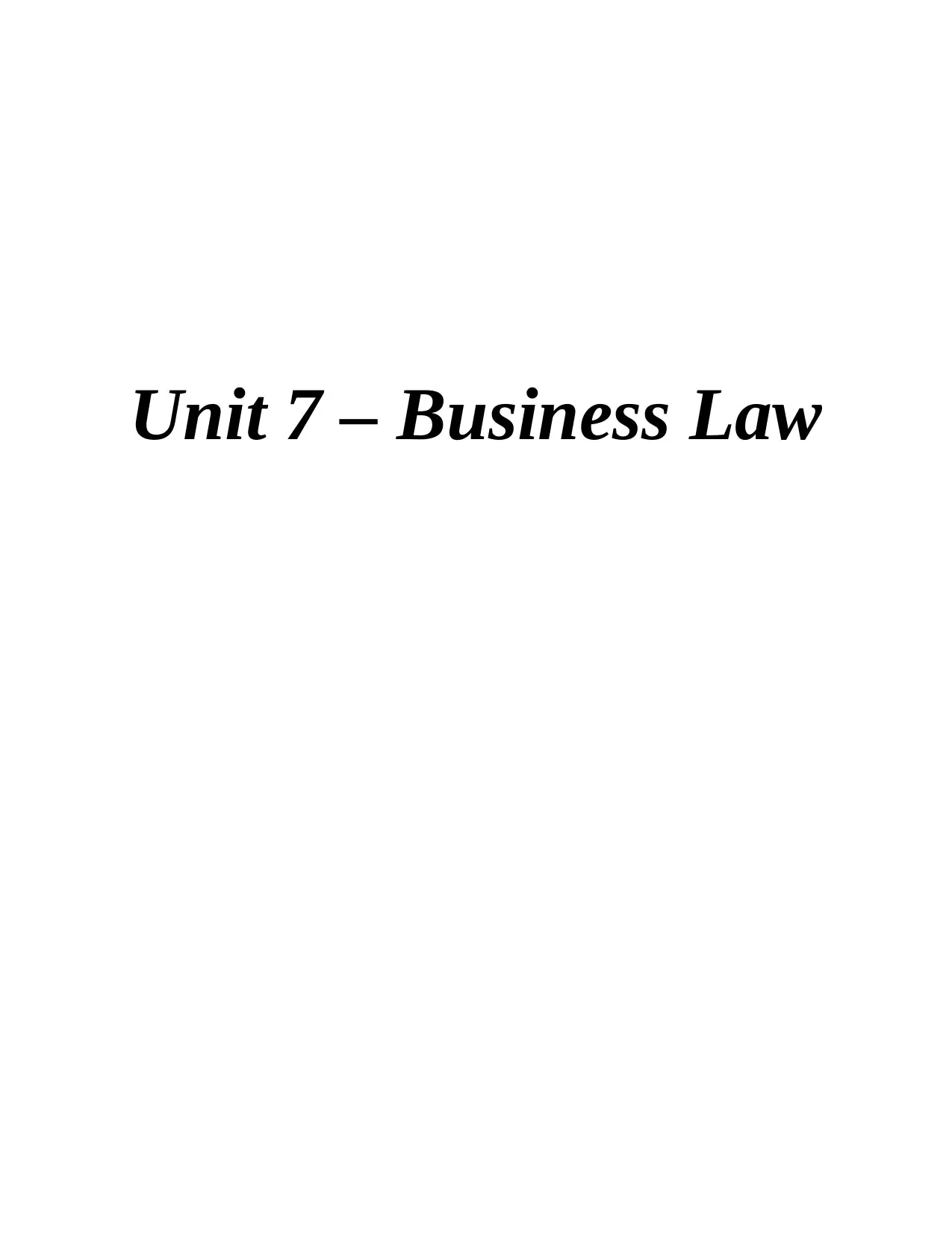
Unit 7 – Business Law
Paraphrase This Document
Need a fresh take? Get an instant paraphrase of this document with our AI Paraphraser
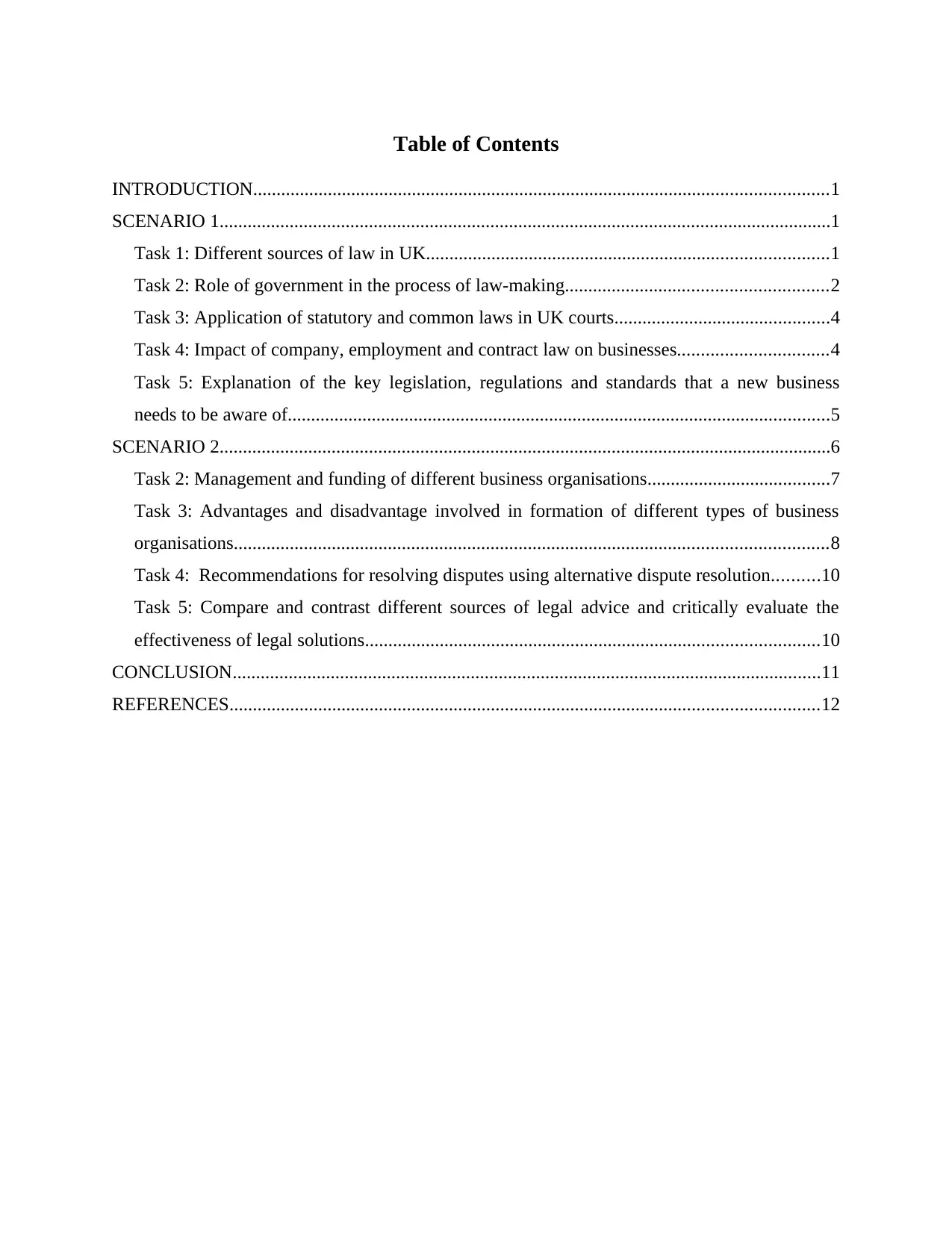
Table of Contents
INTRODUCTION...........................................................................................................................1
SCENARIO 1...................................................................................................................................1
Task 1: Different sources of law in UK......................................................................................1
Task 2: Role of government in the process of law-making........................................................2
Task 3: Application of statutory and common laws in UK courts..............................................4
Task 4: Impact of company, employment and contract law on businesses................................4
Task 5: Explanation of the key legislation, regulations and standards that a new business
needs to be aware of....................................................................................................................5
SCENARIO 2...................................................................................................................................6
Task 2: Management and funding of different business organisations.......................................7
Task 3: Advantages and disadvantage involved in formation of different types of business
organisations...............................................................................................................................8
Task 4: Recommendations for resolving disputes using alternative dispute resolution..........10
Task 5: Compare and contrast different sources of legal advice and critically evaluate the
effectiveness of legal solutions.................................................................................................10
CONCLUSION..............................................................................................................................11
REFERENCES..............................................................................................................................12
INTRODUCTION...........................................................................................................................1
SCENARIO 1...................................................................................................................................1
Task 1: Different sources of law in UK......................................................................................1
Task 2: Role of government in the process of law-making........................................................2
Task 3: Application of statutory and common laws in UK courts..............................................4
Task 4: Impact of company, employment and contract law on businesses................................4
Task 5: Explanation of the key legislation, regulations and standards that a new business
needs to be aware of....................................................................................................................5
SCENARIO 2...................................................................................................................................6
Task 2: Management and funding of different business organisations.......................................7
Task 3: Advantages and disadvantage involved in formation of different types of business
organisations...............................................................................................................................8
Task 4: Recommendations for resolving disputes using alternative dispute resolution..........10
Task 5: Compare and contrast different sources of legal advice and critically evaluate the
effectiveness of legal solutions.................................................................................................10
CONCLUSION..............................................................................................................................11
REFERENCES..............................................................................................................................12
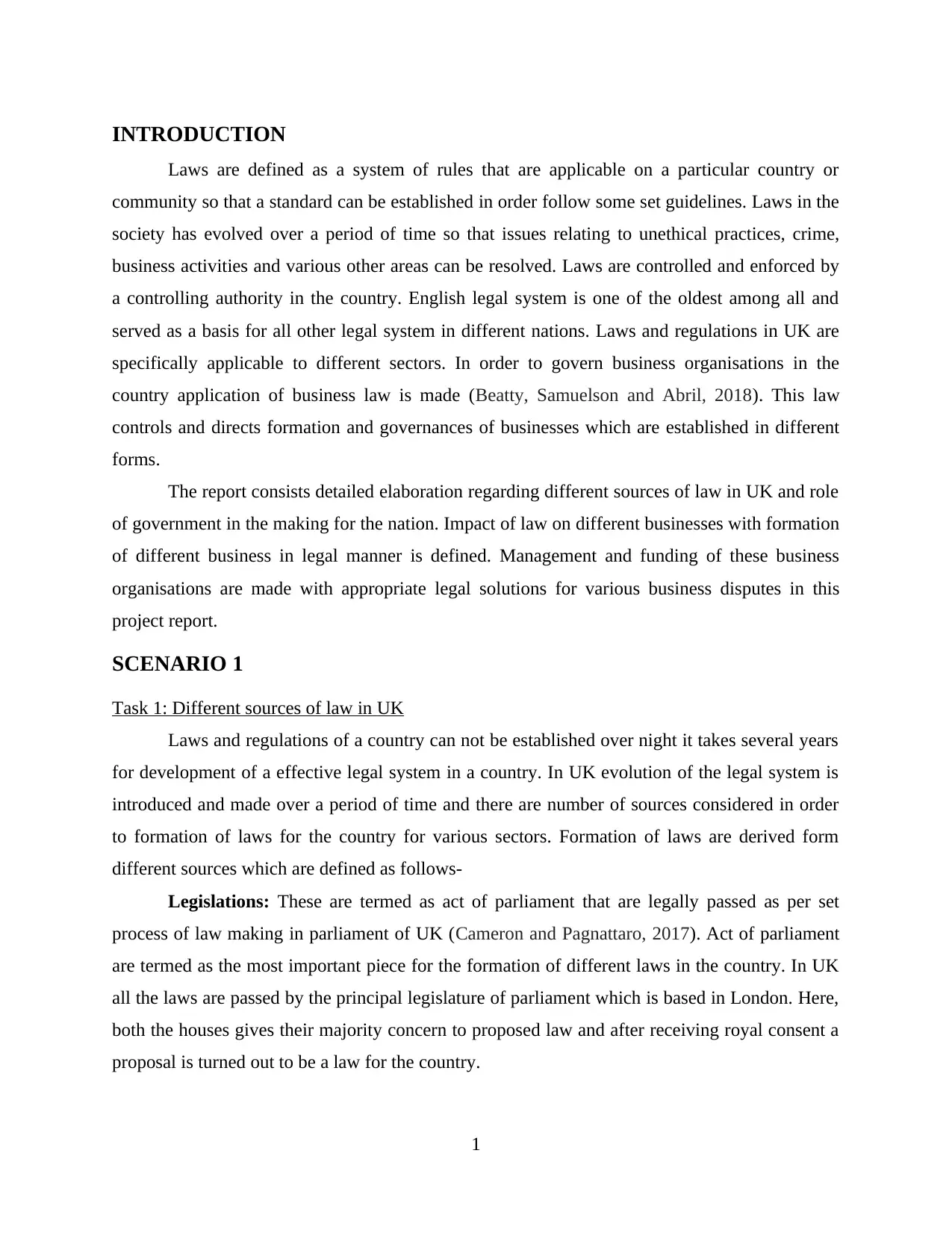
INTRODUCTION
Laws are defined as a system of rules that are applicable on a particular country or
community so that a standard can be established in order follow some set guidelines. Laws in the
society has evolved over a period of time so that issues relating to unethical practices, crime,
business activities and various other areas can be resolved. Laws are controlled and enforced by
a controlling authority in the country. English legal system is one of the oldest among all and
served as a basis for all other legal system in different nations. Laws and regulations in UK are
specifically applicable to different sectors. In order to govern business organisations in the
country application of business law is made (Beatty, Samuelson and Abril, 2018). This law
controls and directs formation and governances of businesses which are established in different
forms.
The report consists detailed elaboration regarding different sources of law in UK and role
of government in the making for the nation. Impact of law on different businesses with formation
of different business in legal manner is defined. Management and funding of these business
organisations are made with appropriate legal solutions for various business disputes in this
project report.
SCENARIO 1
Task 1: Different sources of law in UK
Laws and regulations of a country can not be established over night it takes several years
for development of a effective legal system in a country. In UK evolution of the legal system is
introduced and made over a period of time and there are number of sources considered in order
to formation of laws for the country for various sectors. Formation of laws are derived form
different sources which are defined as follows-
Legislations: These are termed as act of parliament that are legally passed as per set
process of law making in parliament of UK (Cameron and Pagnattaro, 2017). Act of parliament
are termed as the most important piece for the formation of different laws in the country. In UK
all the laws are passed by the principal legislature of parliament which is based in London. Here,
both the houses gives their majority concern to proposed law and after receiving royal consent a
proposal is turned out to be a law for the country.
1
Laws are defined as a system of rules that are applicable on a particular country or
community so that a standard can be established in order follow some set guidelines. Laws in the
society has evolved over a period of time so that issues relating to unethical practices, crime,
business activities and various other areas can be resolved. Laws are controlled and enforced by
a controlling authority in the country. English legal system is one of the oldest among all and
served as a basis for all other legal system in different nations. Laws and regulations in UK are
specifically applicable to different sectors. In order to govern business organisations in the
country application of business law is made (Beatty, Samuelson and Abril, 2018). This law
controls and directs formation and governances of businesses which are established in different
forms.
The report consists detailed elaboration regarding different sources of law in UK and role
of government in the making for the nation. Impact of law on different businesses with formation
of different business in legal manner is defined. Management and funding of these business
organisations are made with appropriate legal solutions for various business disputes in this
project report.
SCENARIO 1
Task 1: Different sources of law in UK
Laws and regulations of a country can not be established over night it takes several years
for development of a effective legal system in a country. In UK evolution of the legal system is
introduced and made over a period of time and there are number of sources considered in order
to formation of laws for the country for various sectors. Formation of laws are derived form
different sources which are defined as follows-
Legislations: These are termed as act of parliament that are legally passed as per set
process of law making in parliament of UK (Cameron and Pagnattaro, 2017). Act of parliament
are termed as the most important piece for the formation of different laws in the country. In UK
all the laws are passed by the principal legislature of parliament which is based in London. Here,
both the houses gives their majority concern to proposed law and after receiving royal consent a
proposal is turned out to be a law for the country.
1
⊘ This is a preview!⊘
Do you want full access?
Subscribe today to unlock all pages.

Trusted by 1+ million students worldwide
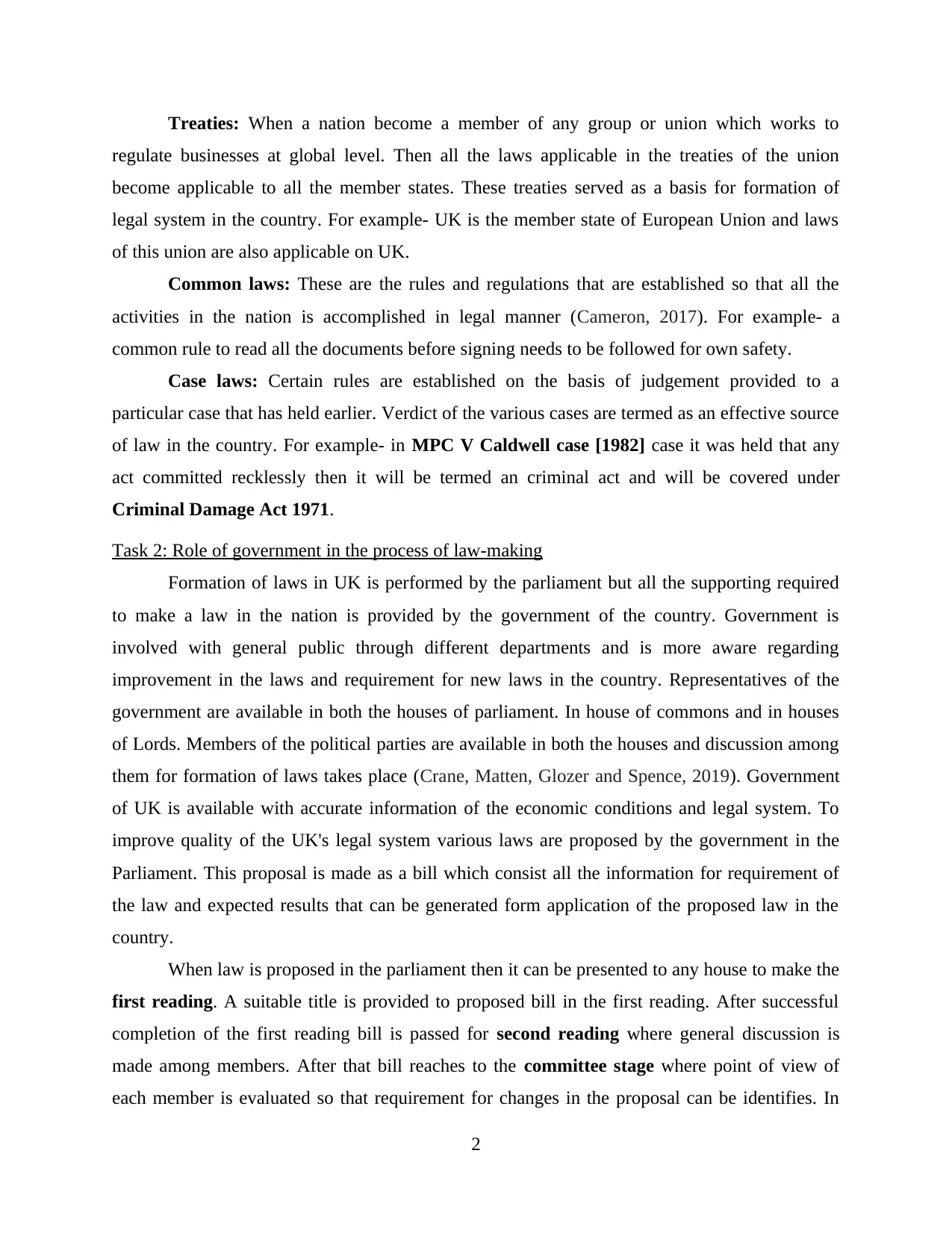
Treaties: When a nation become a member of any group or union which works to
regulate businesses at global level. Then all the laws applicable in the treaties of the union
become applicable to all the member states. These treaties served as a basis for formation of
legal system in the country. For example- UK is the member state of European Union and laws
of this union are also applicable on UK.
Common laws: These are the rules and regulations that are established so that all the
activities in the nation is accomplished in legal manner (Cameron, 2017). For example- a
common rule to read all the documents before signing needs to be followed for own safety.
Case laws: Certain rules are established on the basis of judgement provided to a
particular case that has held earlier. Verdict of the various cases are termed as an effective source
of law in the country. For example- in MPC V Caldwell case [1982] case it was held that any
act committed recklessly then it will be termed an criminal act and will be covered under
Criminal Damage Act 1971.
Task 2: Role of government in the process of law-making
Formation of laws in UK is performed by the parliament but all the supporting required
to make a law in the nation is provided by the government of the country. Government is
involved with general public through different departments and is more aware regarding
improvement in the laws and requirement for new laws in the country. Representatives of the
government are available in both the houses of parliament. In house of commons and in houses
of Lords. Members of the political parties are available in both the houses and discussion among
them for formation of laws takes place (Crane, Matten, Glozer and Spence, 2019). Government
of UK is available with accurate information of the economic conditions and legal system. To
improve quality of the UK's legal system various laws are proposed by the government in the
Parliament. This proposal is made as a bill which consist all the information for requirement of
the law and expected results that can be generated form application of the proposed law in the
country.
When law is proposed in the parliament then it can be presented to any house to make the
first reading. A suitable title is provided to proposed bill in the first reading. After successful
completion of the first reading bill is passed for second reading where general discussion is
made among members. After that bill reaches to the committee stage where point of view of
each member is evaluated so that requirement for changes in the proposal can be identifies. In
2
regulate businesses at global level. Then all the laws applicable in the treaties of the union
become applicable to all the member states. These treaties served as a basis for formation of
legal system in the country. For example- UK is the member state of European Union and laws
of this union are also applicable on UK.
Common laws: These are the rules and regulations that are established so that all the
activities in the nation is accomplished in legal manner (Cameron, 2017). For example- a
common rule to read all the documents before signing needs to be followed for own safety.
Case laws: Certain rules are established on the basis of judgement provided to a
particular case that has held earlier. Verdict of the various cases are termed as an effective source
of law in the country. For example- in MPC V Caldwell case [1982] case it was held that any
act committed recklessly then it will be termed an criminal act and will be covered under
Criminal Damage Act 1971.
Task 2: Role of government in the process of law-making
Formation of laws in UK is performed by the parliament but all the supporting required
to make a law in the nation is provided by the government of the country. Government is
involved with general public through different departments and is more aware regarding
improvement in the laws and requirement for new laws in the country. Representatives of the
government are available in both the houses of parliament. In house of commons and in houses
of Lords. Members of the political parties are available in both the houses and discussion among
them for formation of laws takes place (Crane, Matten, Glozer and Spence, 2019). Government
of UK is available with accurate information of the economic conditions and legal system. To
improve quality of the UK's legal system various laws are proposed by the government in the
Parliament. This proposal is made as a bill which consist all the information for requirement of
the law and expected results that can be generated form application of the proposed law in the
country.
When law is proposed in the parliament then it can be presented to any house to make the
first reading. A suitable title is provided to proposed bill in the first reading. After successful
completion of the first reading bill is passed for second reading where general discussion is
made among members. After that bill reaches to the committee stage where point of view of
each member is evaluated so that requirement for changes in the proposal can be identifies. In
2
Paraphrase This Document
Need a fresh take? Get an instant paraphrase of this document with our AI Paraphraser
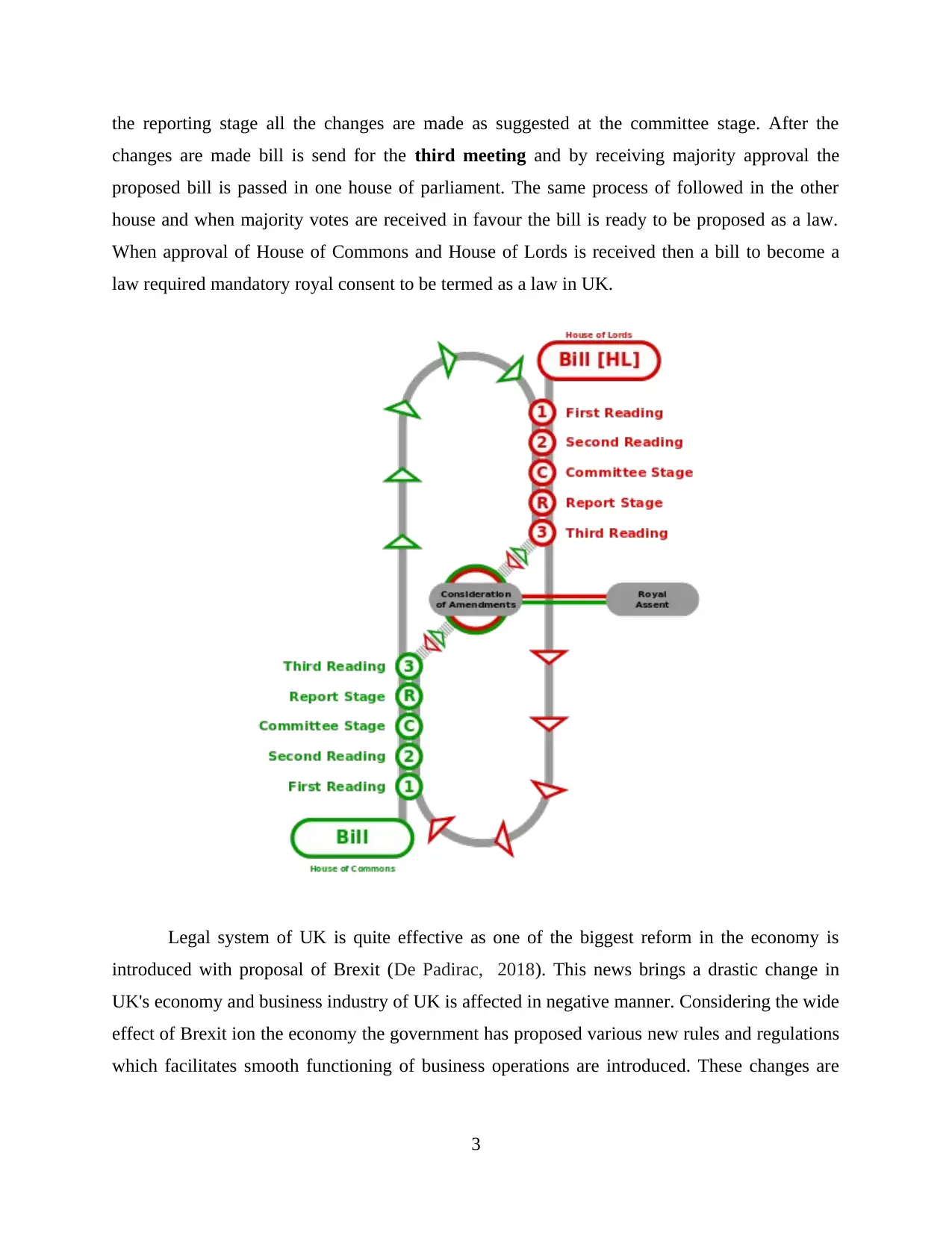
the reporting stage all the changes are made as suggested at the committee stage. After the
changes are made bill is send for the third meeting and by receiving majority approval the
proposed bill is passed in one house of parliament. The same process of followed in the other
house and when majority votes are received in favour the bill is ready to be proposed as a law.
When approval of House of Commons and House of Lords is received then a bill to become a
law required mandatory royal consent to be termed as a law in UK.
Legal system of UK is quite effective as one of the biggest reform in the economy is
introduced with proposal of Brexit (De Padirac, 2018). This news brings a drastic change in
UK's economy and business industry of UK is affected in negative manner. Considering the wide
effect of Brexit ion the economy the government has proposed various new rules and regulations
which facilitates smooth functioning of business operations are introduced. These changes are
3
changes are made bill is send for the third meeting and by receiving majority approval the
proposed bill is passed in one house of parliament. The same process of followed in the other
house and when majority votes are received in favour the bill is ready to be proposed as a law.
When approval of House of Commons and House of Lords is received then a bill to become a
law required mandatory royal consent to be termed as a law in UK.
Legal system of UK is quite effective as one of the biggest reform in the economy is
introduced with proposal of Brexit (De Padirac, 2018). This news brings a drastic change in
UK's economy and business industry of UK is affected in negative manner. Considering the wide
effect of Brexit ion the economy the government has proposed various new rules and regulations
which facilitates smooth functioning of business operations are introduced. These changes are
3
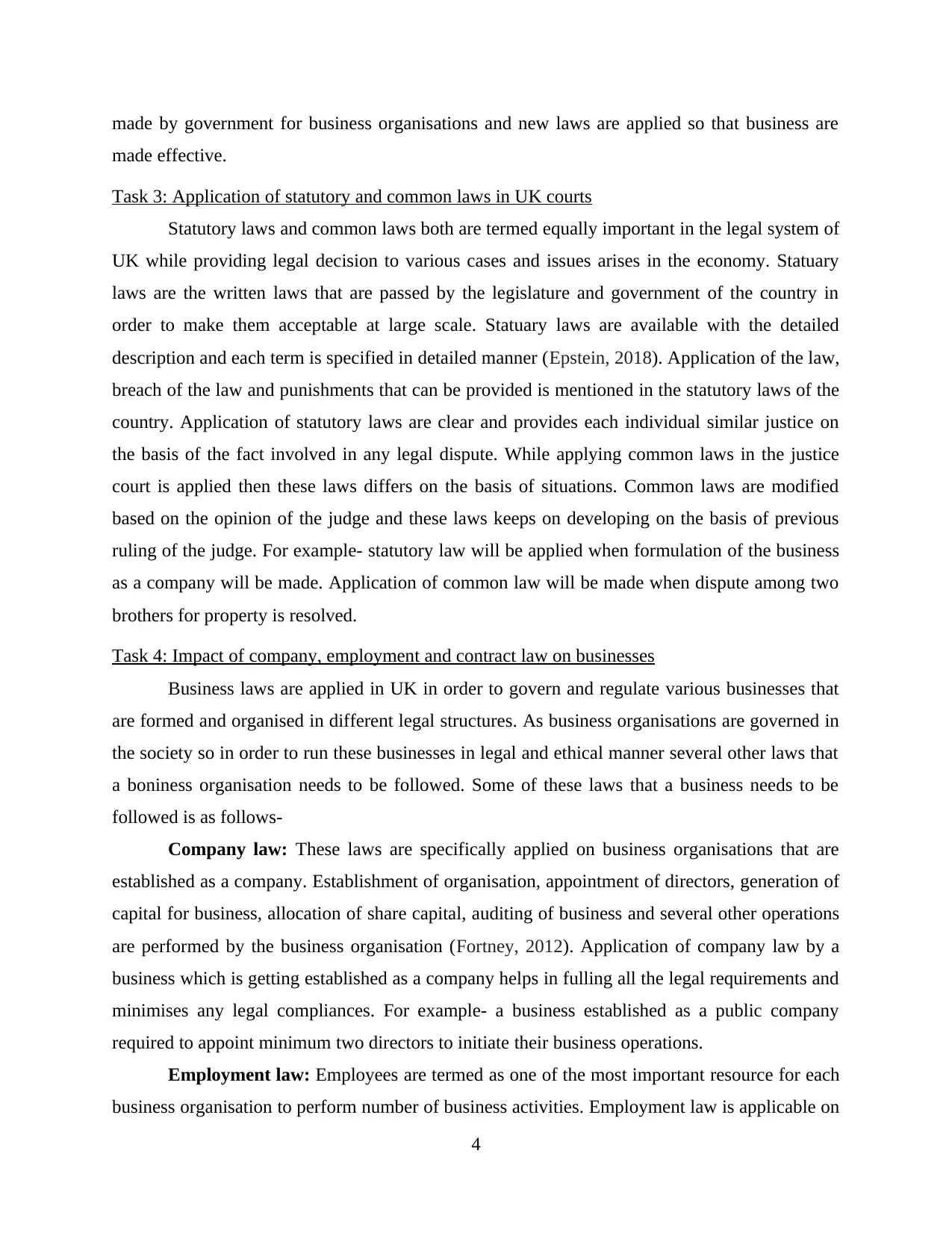
made by government for business organisations and new laws are applied so that business are
made effective.
Task 3: Application of statutory and common laws in UK courts
Statutory laws and common laws both are termed equally important in the legal system of
UK while providing legal decision to various cases and issues arises in the economy. Statuary
laws are the written laws that are passed by the legislature and government of the country in
order to make them acceptable at large scale. Statuary laws are available with the detailed
description and each term is specified in detailed manner (Epstein, 2018). Application of the law,
breach of the law and punishments that can be provided is mentioned in the statutory laws of the
country. Application of statutory laws are clear and provides each individual similar justice on
the basis of the fact involved in any legal dispute. While applying common laws in the justice
court is applied then these laws differs on the basis of situations. Common laws are modified
based on the opinion of the judge and these laws keeps on developing on the basis of previous
ruling of the judge. For example- statutory law will be applied when formulation of the business
as a company will be made. Application of common law will be made when dispute among two
brothers for property is resolved.
Task 4: Impact of company, employment and contract law on businesses
Business laws are applied in UK in order to govern and regulate various businesses that
are formed and organised in different legal structures. As business organisations are governed in
the society so in order to run these businesses in legal and ethical manner several other laws that
a boniness organisation needs to be followed. Some of these laws that a business needs to be
followed is as follows-
Company law: These laws are specifically applied on business organisations that are
established as a company. Establishment of organisation, appointment of directors, generation of
capital for business, allocation of share capital, auditing of business and several other operations
are performed by the business organisation (Fortney, 2012). Application of company law by a
business which is getting established as a company helps in fulling all the legal requirements and
minimises any legal compliances. For example- a business established as a public company
required to appoint minimum two directors to initiate their business operations.
Employment law: Employees are termed as one of the most important resource for each
business organisation to perform number of business activities. Employment law is applicable on
4
made effective.
Task 3: Application of statutory and common laws in UK courts
Statutory laws and common laws both are termed equally important in the legal system of
UK while providing legal decision to various cases and issues arises in the economy. Statuary
laws are the written laws that are passed by the legislature and government of the country in
order to make them acceptable at large scale. Statuary laws are available with the detailed
description and each term is specified in detailed manner (Epstein, 2018). Application of the law,
breach of the law and punishments that can be provided is mentioned in the statutory laws of the
country. Application of statutory laws are clear and provides each individual similar justice on
the basis of the fact involved in any legal dispute. While applying common laws in the justice
court is applied then these laws differs on the basis of situations. Common laws are modified
based on the opinion of the judge and these laws keeps on developing on the basis of previous
ruling of the judge. For example- statutory law will be applied when formulation of the business
as a company will be made. Application of common law will be made when dispute among two
brothers for property is resolved.
Task 4: Impact of company, employment and contract law on businesses
Business laws are applied in UK in order to govern and regulate various businesses that
are formed and organised in different legal structures. As business organisations are governed in
the society so in order to run these businesses in legal and ethical manner several other laws that
a boniness organisation needs to be followed. Some of these laws that a business needs to be
followed is as follows-
Company law: These laws are specifically applied on business organisations that are
established as a company. Establishment of organisation, appointment of directors, generation of
capital for business, allocation of share capital, auditing of business and several other operations
are performed by the business organisation (Fortney, 2012). Application of company law by a
business which is getting established as a company helps in fulling all the legal requirements and
minimises any legal compliances. For example- a business established as a public company
required to appoint minimum two directors to initiate their business operations.
Employment law: Employees are termed as one of the most important resource for each
business organisation to perform number of business activities. Employment law is applicable on
4
⊘ This is a preview!⊘
Do you want full access?
Subscribe today to unlock all pages.

Trusted by 1+ million students worldwide
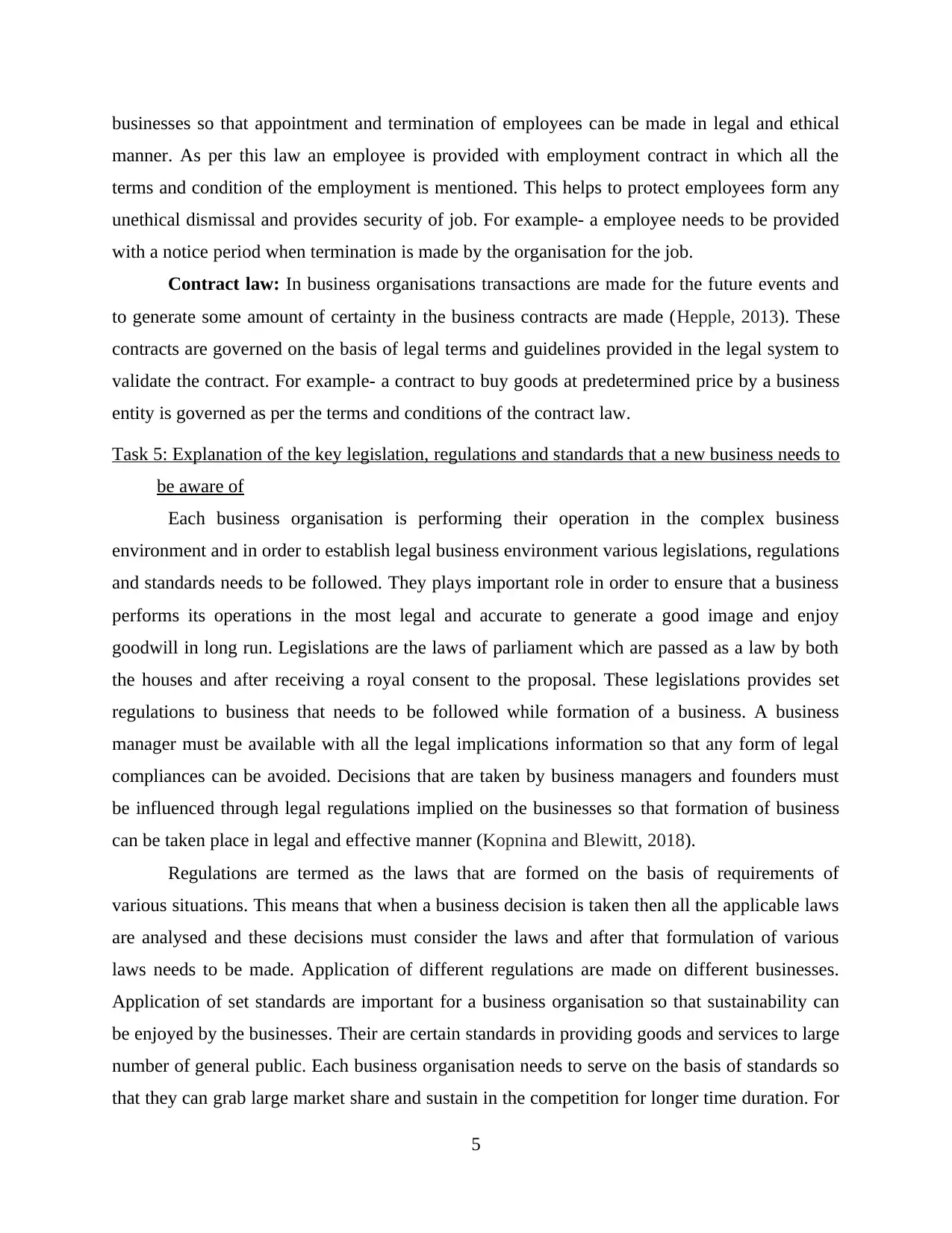
businesses so that appointment and termination of employees can be made in legal and ethical
manner. As per this law an employee is provided with employment contract in which all the
terms and condition of the employment is mentioned. This helps to protect employees form any
unethical dismissal and provides security of job. For example- a employee needs to be provided
with a notice period when termination is made by the organisation for the job.
Contract law: In business organisations transactions are made for the future events and
to generate some amount of certainty in the business contracts are made (Hepple, 2013). These
contracts are governed on the basis of legal terms and guidelines provided in the legal system to
validate the contract. For example- a contract to buy goods at predetermined price by a business
entity is governed as per the terms and conditions of the contract law.
Task 5: Explanation of the key legislation, regulations and standards that a new business needs to
be aware of
Each business organisation is performing their operation in the complex business
environment and in order to establish legal business environment various legislations, regulations
and standards needs to be followed. They plays important role in order to ensure that a business
performs its operations in the most legal and accurate to generate a good image and enjoy
goodwill in long run. Legislations are the laws of parliament which are passed as a law by both
the houses and after receiving a royal consent to the proposal. These legislations provides set
regulations to business that needs to be followed while formation of a business. A business
manager must be available with all the legal implications information so that any form of legal
compliances can be avoided. Decisions that are taken by business managers and founders must
be influenced through legal regulations implied on the businesses so that formation of business
can be taken place in legal and effective manner (Kopnina and Blewitt, 2018).
Regulations are termed as the laws that are formed on the basis of requirements of
various situations. This means that when a business decision is taken then all the applicable laws
are analysed and these decisions must consider the laws and after that formulation of various
laws needs to be made. Application of different regulations are made on different businesses.
Application of set standards are important for a business organisation so that sustainability can
be enjoyed by the businesses. Their are certain standards in providing goods and services to large
number of general public. Each business organisation needs to serve on the basis of standards so
that they can grab large market share and sustain in the competition for longer time duration. For
5
manner. As per this law an employee is provided with employment contract in which all the
terms and condition of the employment is mentioned. This helps to protect employees form any
unethical dismissal and provides security of job. For example- a employee needs to be provided
with a notice period when termination is made by the organisation for the job.
Contract law: In business organisations transactions are made for the future events and
to generate some amount of certainty in the business contracts are made (Hepple, 2013). These
contracts are governed on the basis of legal terms and guidelines provided in the legal system to
validate the contract. For example- a contract to buy goods at predetermined price by a business
entity is governed as per the terms and conditions of the contract law.
Task 5: Explanation of the key legislation, regulations and standards that a new business needs to
be aware of
Each business organisation is performing their operation in the complex business
environment and in order to establish legal business environment various legislations, regulations
and standards needs to be followed. They plays important role in order to ensure that a business
performs its operations in the most legal and accurate to generate a good image and enjoy
goodwill in long run. Legislations are the laws of parliament which are passed as a law by both
the houses and after receiving a royal consent to the proposal. These legislations provides set
regulations to business that needs to be followed while formation of a business. A business
manager must be available with all the legal implications information so that any form of legal
compliances can be avoided. Decisions that are taken by business managers and founders must
be influenced through legal regulations implied on the businesses so that formation of business
can be taken place in legal and effective manner (Kopnina and Blewitt, 2018).
Regulations are termed as the laws that are formed on the basis of requirements of
various situations. This means that when a business decision is taken then all the applicable laws
are analysed and these decisions must consider the laws and after that formulation of various
laws needs to be made. Application of different regulations are made on different businesses.
Application of set standards are important for a business organisation so that sustainability can
be enjoyed by the businesses. Their are certain standards in providing goods and services to large
number of general public. Each business organisation needs to serve on the basis of standards so
that they can grab large market share and sustain in the competition for longer time duration. For
5
Paraphrase This Document
Need a fresh take? Get an instant paraphrase of this document with our AI Paraphraser
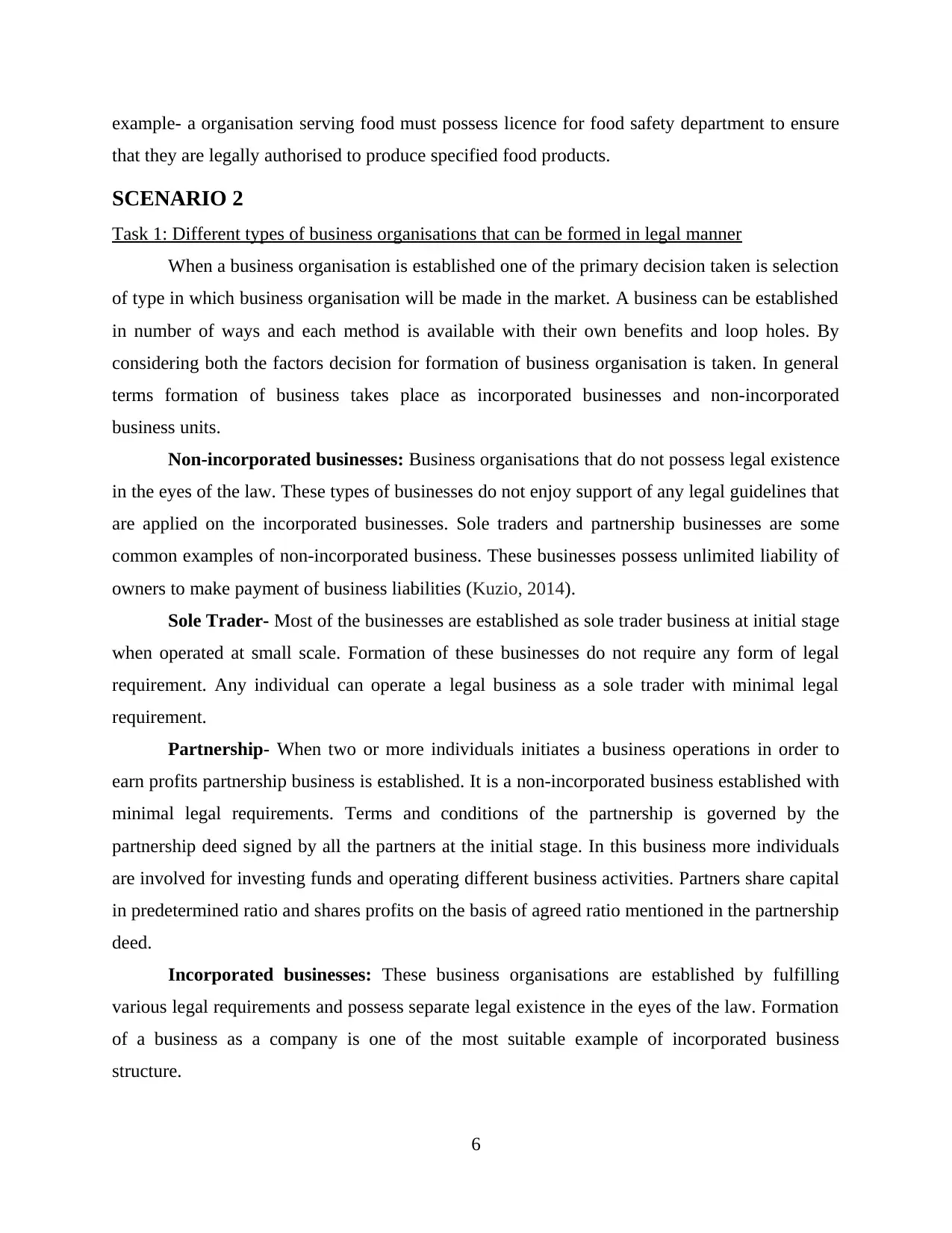
example- a organisation serving food must possess licence for food safety department to ensure
that they are legally authorised to produce specified food products.
SCENARIO 2
Task 1: Different types of business organisations that can be formed in legal manner
When a business organisation is established one of the primary decision taken is selection
of type in which business organisation will be made in the market. A business can be established
in number of ways and each method is available with their own benefits and loop holes. By
considering both the factors decision for formation of business organisation is taken. In general
terms formation of business takes place as incorporated businesses and non-incorporated
business units.
Non-incorporated businesses: Business organisations that do not possess legal existence
in the eyes of the law. These types of businesses do not enjoy support of any legal guidelines that
are applied on the incorporated businesses. Sole traders and partnership businesses are some
common examples of non-incorporated business. These businesses possess unlimited liability of
owners to make payment of business liabilities (Kuzio, 2014).
Sole Trader- Most of the businesses are established as sole trader business at initial stage
when operated at small scale. Formation of these businesses do not require any form of legal
requirement. Any individual can operate a legal business as a sole trader with minimal legal
requirement.
Partnership- When two or more individuals initiates a business operations in order to
earn profits partnership business is established. It is a non-incorporated business established with
minimal legal requirements. Terms and conditions of the partnership is governed by the
partnership deed signed by all the partners at the initial stage. In this business more individuals
are involved for investing funds and operating different business activities. Partners share capital
in predetermined ratio and shares profits on the basis of agreed ratio mentioned in the partnership
deed.
Incorporated businesses: These business organisations are established by fulfilling
various legal requirements and possess separate legal existence in the eyes of the law. Formation
of a business as a company is one of the most suitable example of incorporated business
structure.
6
that they are legally authorised to produce specified food products.
SCENARIO 2
Task 1: Different types of business organisations that can be formed in legal manner
When a business organisation is established one of the primary decision taken is selection
of type in which business organisation will be made in the market. A business can be established
in number of ways and each method is available with their own benefits and loop holes. By
considering both the factors decision for formation of business organisation is taken. In general
terms formation of business takes place as incorporated businesses and non-incorporated
business units.
Non-incorporated businesses: Business organisations that do not possess legal existence
in the eyes of the law. These types of businesses do not enjoy support of any legal guidelines that
are applied on the incorporated businesses. Sole traders and partnership businesses are some
common examples of non-incorporated business. These businesses possess unlimited liability of
owners to make payment of business liabilities (Kuzio, 2014).
Sole Trader- Most of the businesses are established as sole trader business at initial stage
when operated at small scale. Formation of these businesses do not require any form of legal
requirement. Any individual can operate a legal business as a sole trader with minimal legal
requirement.
Partnership- When two or more individuals initiates a business operations in order to
earn profits partnership business is established. It is a non-incorporated business established with
minimal legal requirements. Terms and conditions of the partnership is governed by the
partnership deed signed by all the partners at the initial stage. In this business more individuals
are involved for investing funds and operating different business activities. Partners share capital
in predetermined ratio and shares profits on the basis of agreed ratio mentioned in the partnership
deed.
Incorporated businesses: These business organisations are established by fulfilling
various legal requirements and possess separate legal existence in the eyes of the law. Formation
of a business as a company is one of the most suitable example of incorporated business
structure.
6
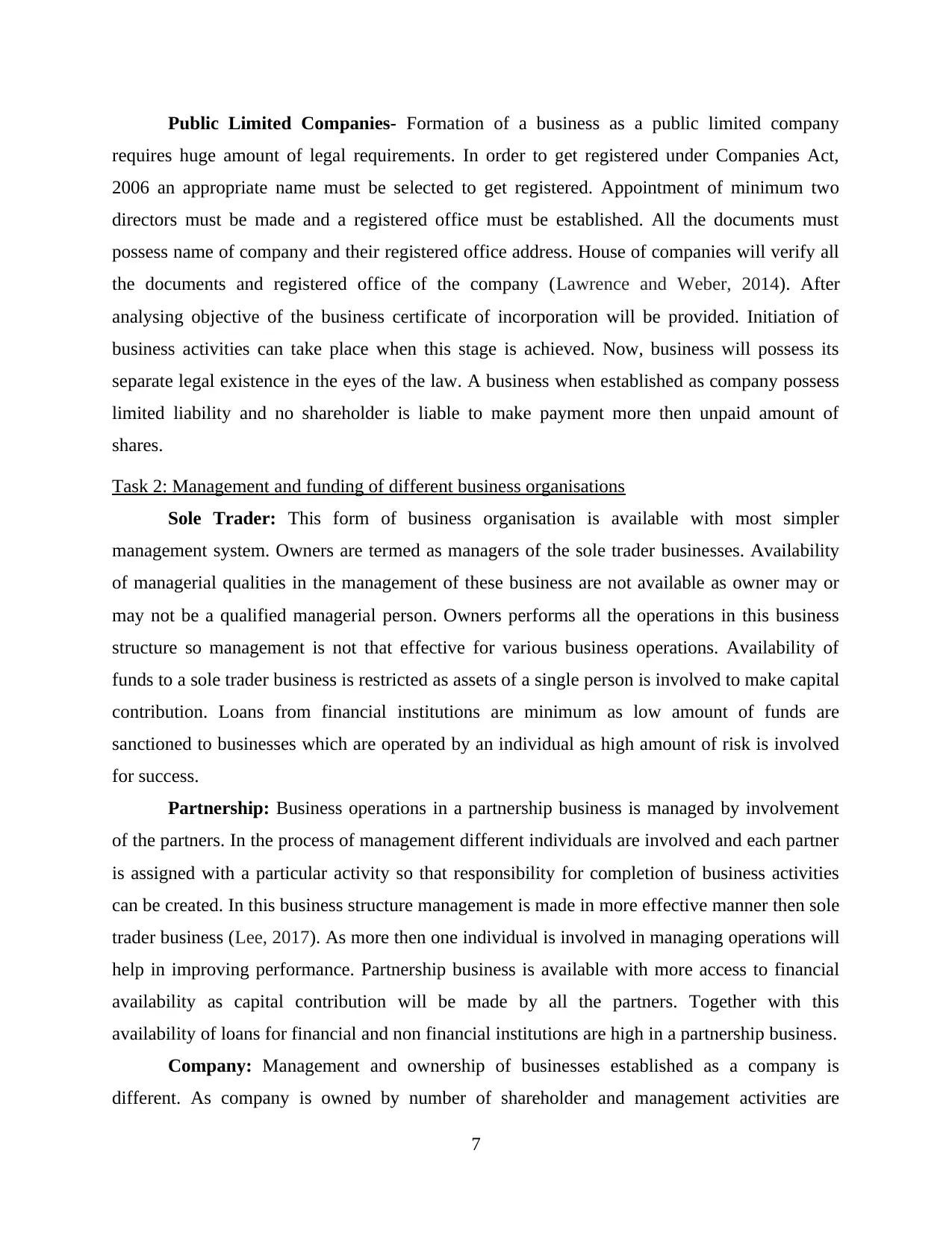
Public Limited Companies- Formation of a business as a public limited company
requires huge amount of legal requirements. In order to get registered under Companies Act,
2006 an appropriate name must be selected to get registered. Appointment of minimum two
directors must be made and a registered office must be established. All the documents must
possess name of company and their registered office address. House of companies will verify all
the documents and registered office of the company (Lawrence and Weber, 2014). After
analysing objective of the business certificate of incorporation will be provided. Initiation of
business activities can take place when this stage is achieved. Now, business will possess its
separate legal existence in the eyes of the law. A business when established as company possess
limited liability and no shareholder is liable to make payment more then unpaid amount of
shares.
Task 2: Management and funding of different business organisations
Sole Trader: This form of business organisation is available with most simpler
management system. Owners are termed as managers of the sole trader businesses. Availability
of managerial qualities in the management of these business are not available as owner may or
may not be a qualified managerial person. Owners performs all the operations in this business
structure so management is not that effective for various business operations. Availability of
funds to a sole trader business is restricted as assets of a single person is involved to make capital
contribution. Loans from financial institutions are minimum as low amount of funds are
sanctioned to businesses which are operated by an individual as high amount of risk is involved
for success.
Partnership: Business operations in a partnership business is managed by involvement
of the partners. In the process of management different individuals are involved and each partner
is assigned with a particular activity so that responsibility for completion of business activities
can be created. In this business structure management is made in more effective manner then sole
trader business (Lee, 2017). As more then one individual is involved in managing operations will
help in improving performance. Partnership business is available with more access to financial
availability as capital contribution will be made by all the partners. Together with this
availability of loans for financial and non financial institutions are high in a partnership business.
Company: Management and ownership of businesses established as a company is
different. As company is owned by number of shareholder and management activities are
7
requires huge amount of legal requirements. In order to get registered under Companies Act,
2006 an appropriate name must be selected to get registered. Appointment of minimum two
directors must be made and a registered office must be established. All the documents must
possess name of company and their registered office address. House of companies will verify all
the documents and registered office of the company (Lawrence and Weber, 2014). After
analysing objective of the business certificate of incorporation will be provided. Initiation of
business activities can take place when this stage is achieved. Now, business will possess its
separate legal existence in the eyes of the law. A business when established as company possess
limited liability and no shareholder is liable to make payment more then unpaid amount of
shares.
Task 2: Management and funding of different business organisations
Sole Trader: This form of business organisation is available with most simpler
management system. Owners are termed as managers of the sole trader businesses. Availability
of managerial qualities in the management of these business are not available as owner may or
may not be a qualified managerial person. Owners performs all the operations in this business
structure so management is not that effective for various business operations. Availability of
funds to a sole trader business is restricted as assets of a single person is involved to make capital
contribution. Loans from financial institutions are minimum as low amount of funds are
sanctioned to businesses which are operated by an individual as high amount of risk is involved
for success.
Partnership: Business operations in a partnership business is managed by involvement
of the partners. In the process of management different individuals are involved and each partner
is assigned with a particular activity so that responsibility for completion of business activities
can be created. In this business structure management is made in more effective manner then sole
trader business (Lee, 2017). As more then one individual is involved in managing operations will
help in improving performance. Partnership business is available with more access to financial
availability as capital contribution will be made by all the partners. Together with this
availability of loans for financial and non financial institutions are high in a partnership business.
Company: Management and ownership of businesses established as a company is
different. As company is owned by number of shareholder and management activities are
7
⊘ This is a preview!⊘
Do you want full access?
Subscribe today to unlock all pages.

Trusted by 1+ million students worldwide
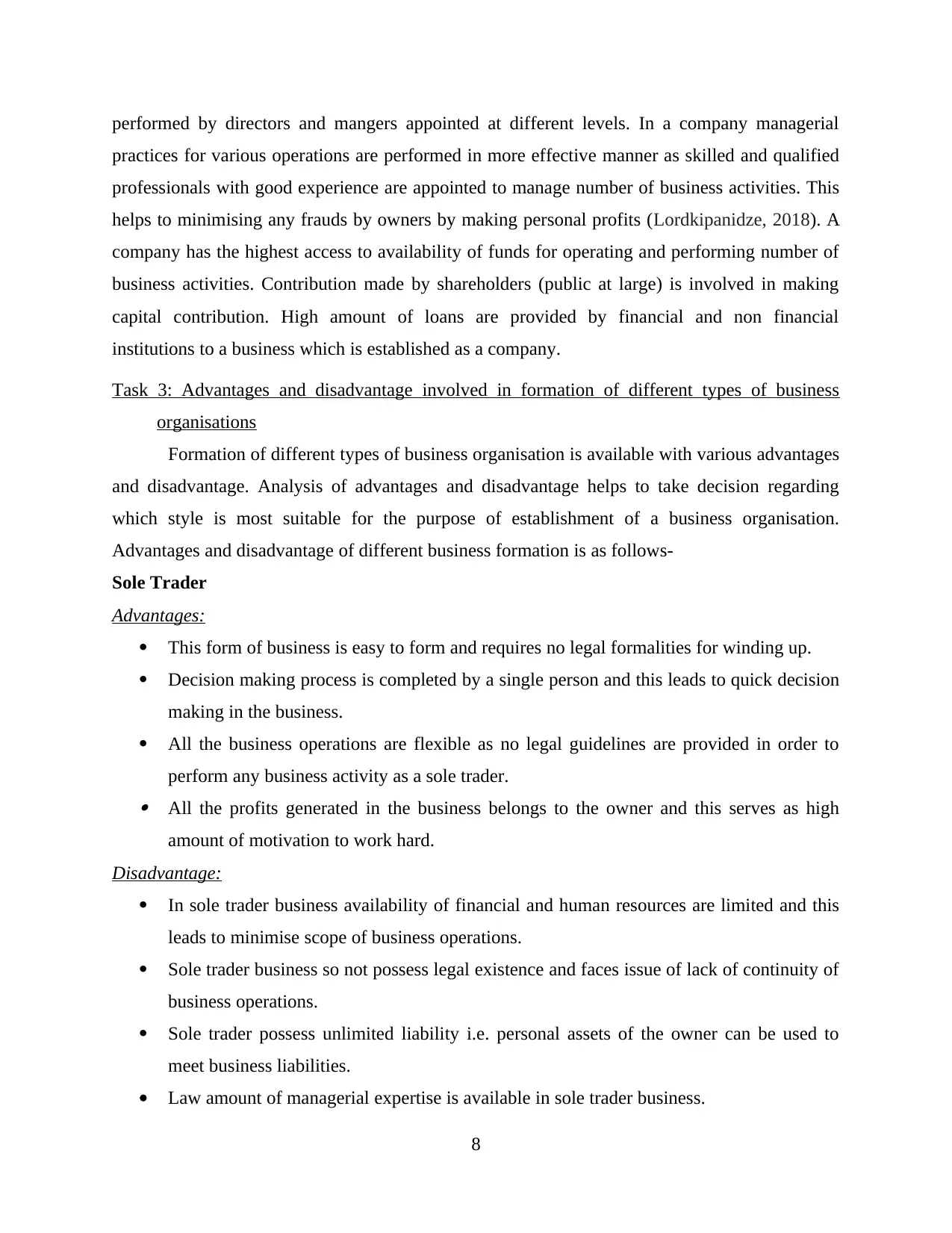
performed by directors and mangers appointed at different levels. In a company managerial
practices for various operations are performed in more effective manner as skilled and qualified
professionals with good experience are appointed to manage number of business activities. This
helps to minimising any frauds by owners by making personal profits (Lordkipanidze, 2018). A
company has the highest access to availability of funds for operating and performing number of
business activities. Contribution made by shareholders (public at large) is involved in making
capital contribution. High amount of loans are provided by financial and non financial
institutions to a business which is established as a company.
Task 3: Advantages and disadvantage involved in formation of different types of business
organisations
Formation of different types of business organisation is available with various advantages
and disadvantage. Analysis of advantages and disadvantage helps to take decision regarding
which style is most suitable for the purpose of establishment of a business organisation.
Advantages and disadvantage of different business formation is as follows-
Sole Trader
Advantages:
This form of business is easy to form and requires no legal formalities for winding up.
Decision making process is completed by a single person and this leads to quick decision
making in the business.
All the business operations are flexible as no legal guidelines are provided in order to
perform any business activity as a sole trader. All the profits generated in the business belongs to the owner and this serves as high
amount of motivation to work hard.
Disadvantage:
In sole trader business availability of financial and human resources are limited and this
leads to minimise scope of business operations.
Sole trader business so not possess legal existence and faces issue of lack of continuity of
business operations.
Sole trader possess unlimited liability i.e. personal assets of the owner can be used to
meet business liabilities.
Law amount of managerial expertise is available in sole trader business.
8
practices for various operations are performed in more effective manner as skilled and qualified
professionals with good experience are appointed to manage number of business activities. This
helps to minimising any frauds by owners by making personal profits (Lordkipanidze, 2018). A
company has the highest access to availability of funds for operating and performing number of
business activities. Contribution made by shareholders (public at large) is involved in making
capital contribution. High amount of loans are provided by financial and non financial
institutions to a business which is established as a company.
Task 3: Advantages and disadvantage involved in formation of different types of business
organisations
Formation of different types of business organisation is available with various advantages
and disadvantage. Analysis of advantages and disadvantage helps to take decision regarding
which style is most suitable for the purpose of establishment of a business organisation.
Advantages and disadvantage of different business formation is as follows-
Sole Trader
Advantages:
This form of business is easy to form and requires no legal formalities for winding up.
Decision making process is completed by a single person and this leads to quick decision
making in the business.
All the business operations are flexible as no legal guidelines are provided in order to
perform any business activity as a sole trader. All the profits generated in the business belongs to the owner and this serves as high
amount of motivation to work hard.
Disadvantage:
In sole trader business availability of financial and human resources are limited and this
leads to minimise scope of business operations.
Sole trader business so not possess legal existence and faces issue of lack of continuity of
business operations.
Sole trader possess unlimited liability i.e. personal assets of the owner can be used to
meet business liabilities.
Law amount of managerial expertise is available in sole trader business.
8
Paraphrase This Document
Need a fresh take? Get an instant paraphrase of this document with our AI Paraphraser
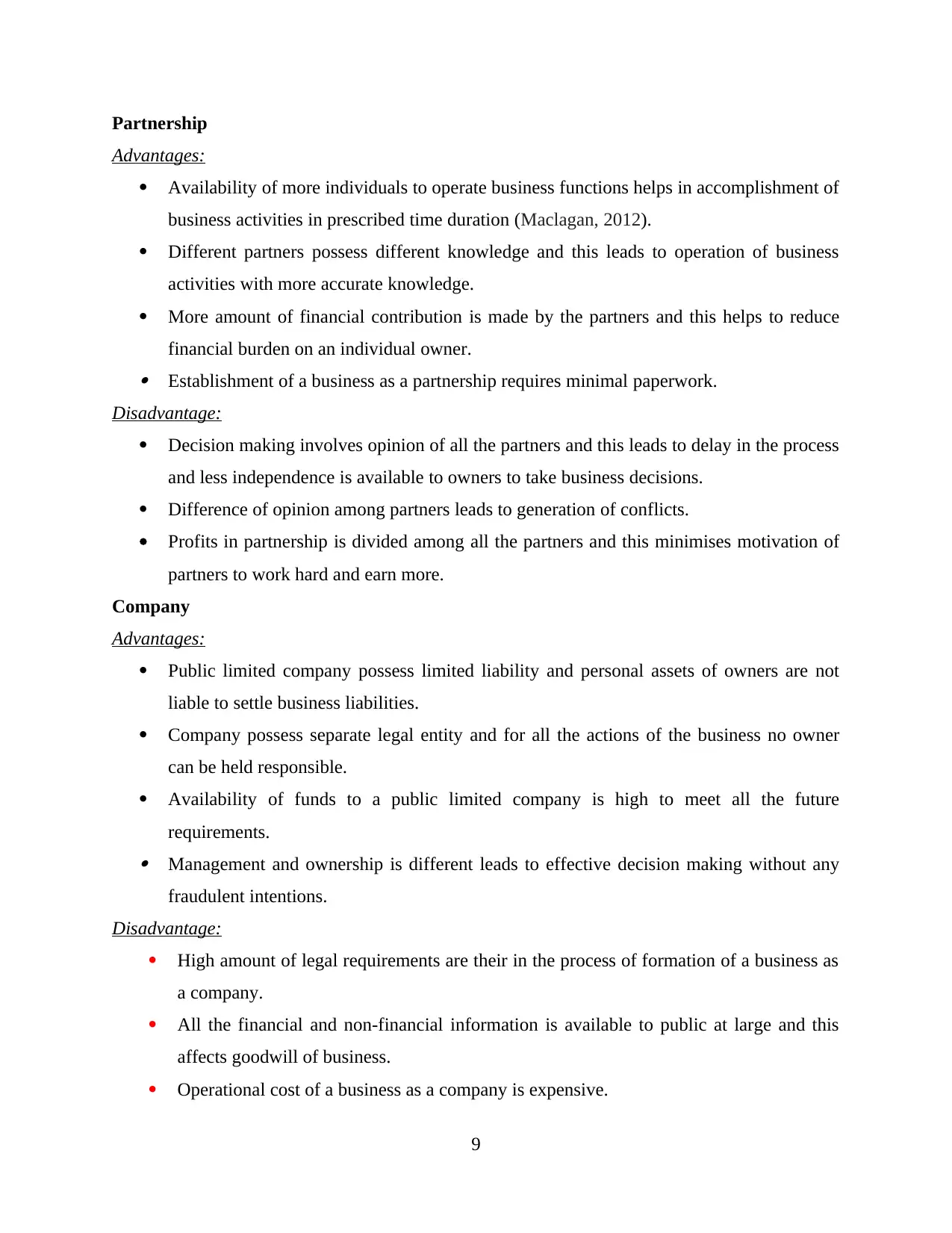
Partnership
Advantages:
Availability of more individuals to operate business functions helps in accomplishment of
business activities in prescribed time duration (Maclagan, 2012).
Different partners possess different knowledge and this leads to operation of business
activities with more accurate knowledge.
More amount of financial contribution is made by the partners and this helps to reduce
financial burden on an individual owner. Establishment of a business as a partnership requires minimal paperwork.
Disadvantage:
Decision making involves opinion of all the partners and this leads to delay in the process
and less independence is available to owners to take business decisions.
Difference of opinion among partners leads to generation of conflicts.
Profits in partnership is divided among all the partners and this minimises motivation of
partners to work hard and earn more.
Company
Advantages:
Public limited company possess limited liability and personal assets of owners are not
liable to settle business liabilities.
Company possess separate legal entity and for all the actions of the business no owner
can be held responsible.
Availability of funds to a public limited company is high to meet all the future
requirements. Management and ownership is different leads to effective decision making without any
fraudulent intentions.
Disadvantage:
High amount of legal requirements are their in the process of formation of a business as
a company.
All the financial and non-financial information is available to public at large and this
affects goodwill of business.
Operational cost of a business as a company is expensive.
9
Advantages:
Availability of more individuals to operate business functions helps in accomplishment of
business activities in prescribed time duration (Maclagan, 2012).
Different partners possess different knowledge and this leads to operation of business
activities with more accurate knowledge.
More amount of financial contribution is made by the partners and this helps to reduce
financial burden on an individual owner. Establishment of a business as a partnership requires minimal paperwork.
Disadvantage:
Decision making involves opinion of all the partners and this leads to delay in the process
and less independence is available to owners to take business decisions.
Difference of opinion among partners leads to generation of conflicts.
Profits in partnership is divided among all the partners and this minimises motivation of
partners to work hard and earn more.
Company
Advantages:
Public limited company possess limited liability and personal assets of owners are not
liable to settle business liabilities.
Company possess separate legal entity and for all the actions of the business no owner
can be held responsible.
Availability of funds to a public limited company is high to meet all the future
requirements. Management and ownership is different leads to effective decision making without any
fraudulent intentions.
Disadvantage:
High amount of legal requirements are their in the process of formation of a business as
a company.
All the financial and non-financial information is available to public at large and this
affects goodwill of business.
Operational cost of a business as a company is expensive.
9
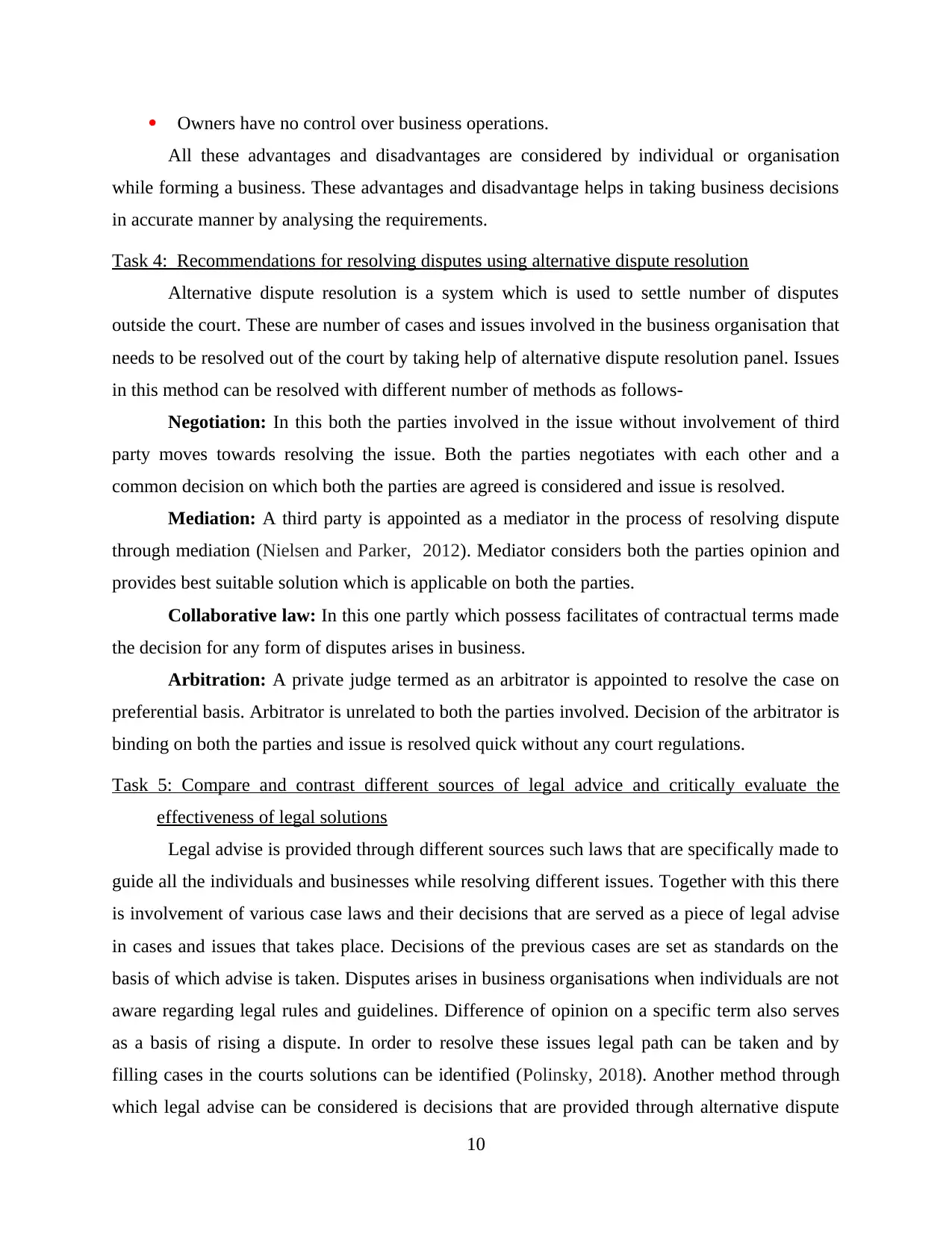
Owners have no control over business operations.
All these advantages and disadvantages are considered by individual or organisation
while forming a business. These advantages and disadvantage helps in taking business decisions
in accurate manner by analysing the requirements.
Task 4: Recommendations for resolving disputes using alternative dispute resolution
Alternative dispute resolution is a system which is used to settle number of disputes
outside the court. These are number of cases and issues involved in the business organisation that
needs to be resolved out of the court by taking help of alternative dispute resolution panel. Issues
in this method can be resolved with different number of methods as follows-
Negotiation: In this both the parties involved in the issue without involvement of third
party moves towards resolving the issue. Both the parties negotiates with each other and a
common decision on which both the parties are agreed is considered and issue is resolved.
Mediation: A third party is appointed as a mediator in the process of resolving dispute
through mediation (Nielsen and Parker, 2012). Mediator considers both the parties opinion and
provides best suitable solution which is applicable on both the parties.
Collaborative law: In this one partly which possess facilitates of contractual terms made
the decision for any form of disputes arises in business.
Arbitration: A private judge termed as an arbitrator is appointed to resolve the case on
preferential basis. Arbitrator is unrelated to both the parties involved. Decision of the arbitrator is
binding on both the parties and issue is resolved quick without any court regulations.
Task 5: Compare and contrast different sources of legal advice and critically evaluate the
effectiveness of legal solutions
Legal advise is provided through different sources such laws that are specifically made to
guide all the individuals and businesses while resolving different issues. Together with this there
is involvement of various case laws and their decisions that are served as a piece of legal advise
in cases and issues that takes place. Decisions of the previous cases are set as standards on the
basis of which advise is taken. Disputes arises in business organisations when individuals are not
aware regarding legal rules and guidelines. Difference of opinion on a specific term also serves
as a basis of rising a dispute. In order to resolve these issues legal path can be taken and by
filling cases in the courts solutions can be identified (Polinsky, 2018). Another method through
which legal advise can be considered is decisions that are provided through alternative dispute
10
All these advantages and disadvantages are considered by individual or organisation
while forming a business. These advantages and disadvantage helps in taking business decisions
in accurate manner by analysing the requirements.
Task 4: Recommendations for resolving disputes using alternative dispute resolution
Alternative dispute resolution is a system which is used to settle number of disputes
outside the court. These are number of cases and issues involved in the business organisation that
needs to be resolved out of the court by taking help of alternative dispute resolution panel. Issues
in this method can be resolved with different number of methods as follows-
Negotiation: In this both the parties involved in the issue without involvement of third
party moves towards resolving the issue. Both the parties negotiates with each other and a
common decision on which both the parties are agreed is considered and issue is resolved.
Mediation: A third party is appointed as a mediator in the process of resolving dispute
through mediation (Nielsen and Parker, 2012). Mediator considers both the parties opinion and
provides best suitable solution which is applicable on both the parties.
Collaborative law: In this one partly which possess facilitates of contractual terms made
the decision for any form of disputes arises in business.
Arbitration: A private judge termed as an arbitrator is appointed to resolve the case on
preferential basis. Arbitrator is unrelated to both the parties involved. Decision of the arbitrator is
binding on both the parties and issue is resolved quick without any court regulations.
Task 5: Compare and contrast different sources of legal advice and critically evaluate the
effectiveness of legal solutions
Legal advise is provided through different sources such laws that are specifically made to
guide all the individuals and businesses while resolving different issues. Together with this there
is involvement of various case laws and their decisions that are served as a piece of legal advise
in cases and issues that takes place. Decisions of the previous cases are set as standards on the
basis of which advise is taken. Disputes arises in business organisations when individuals are not
aware regarding legal rules and guidelines. Difference of opinion on a specific term also serves
as a basis of rising a dispute. In order to resolve these issues legal path can be taken and by
filling cases in the courts solutions can be identified (Polinsky, 2018). Another method through
which legal advise can be considered is decisions that are provided through alternative dispute
10
⊘ This is a preview!⊘
Do you want full access?
Subscribe today to unlock all pages.

Trusted by 1+ million students worldwide
1 out of 14
Related Documents
Your All-in-One AI-Powered Toolkit for Academic Success.
+13062052269
info@desklib.com
Available 24*7 on WhatsApp / Email
![[object Object]](/_next/static/media/star-bottom.7253800d.svg)
Unlock your academic potential
Copyright © 2020–2026 A2Z Services. All Rights Reserved. Developed and managed by ZUCOL.





